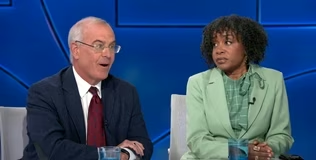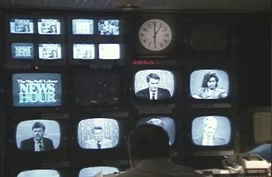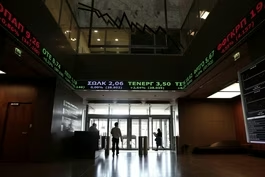
As federal workers miss paychecks, many turn to food banks
Clip: 10/24/2025 | 7m 25sVideo has Closed Captions
As federal workers miss paychecks during shutdown, many turn to food banks for relief
The government shutdown reached day 24 on Friday, marking another milestone for federal workers as they missed a paycheck. That is putting the squeeze on family finances, and many federal workers are now turning to local food banks to help put food on the table. Lisa Desjardins discussed more with Radha Muthiah, the CEO of the Capital Area Food Bank in Washington.
Problems playing video? | Closed Captioning Feedback
Problems playing video? | Closed Captioning Feedback
Major corporate funding for the PBS News Hour is provided by BDO, BNSF, Consumer Cellular, American Cruise Lines, and Raymond James. Funding for the PBS NewsHour Weekend is provided by...

As federal workers miss paychecks, many turn to food banks
Clip: 10/24/2025 | 7m 25sVideo has Closed Captions
The government shutdown reached day 24 on Friday, marking another milestone for federal workers as they missed a paycheck. That is putting the squeeze on family finances, and many federal workers are now turning to local food banks to help put food on the table. Lisa Desjardins discussed more with Radha Muthiah, the CEO of the Capital Area Food Bank in Washington.
Problems playing video? | Closed Captioning Feedback
How to Watch PBS News Hour
PBS News Hour is available to stream on pbs.org and the free PBS App, available on iPhone, Apple TV, Android TV, Android smartphones, Amazon Fire TV, Amazon Fire Tablet, Roku, Samsung Smart TV, and Vizio.
Providing Support for PBS.org
Learn Moreabout PBS online sponsorshipGEOFF BENNETT: Government shutdown day 24 marks another milestone for federal workers, whether they're furloughed or still on the job and missed a paycheck, and that is putting the squeeze on family finances.
As Lisa Desjardins reports, many federal workers are now turning to local food banks to help put food on the table LISA DESJARDINS: In Northern Virginia today... WOMAN: Hello.
LISA DESJARDINS: ... a line of cars that stretched nearly a mile made of federal workers stretched thin by the government shutdown.
LETITIA POOLE, Impacted Federal Worker: The funds that I do have are pretty much depleted by this point.
LISA DESJARDINS: It's the third day the Capital Area Food Bank has specifically served federal employees... MAN: This one's dry goods.
LISA DESJARDINS: ... this time at two different locations.
Unpaid workers and contractors waiting in line said they have had to make cutbacks, like Valy Bennett, a single mother who works for the Department of Homeland Security.
VALY BENNETT, Impacted Federal Worker: I have a kid in college, a senior in high school.
A senior in high school it's a lot of celebration, a lot of things that you want to do since it's your last year in high school.
And we have to slow down all the activities.
LISA DESJARDINS: More than a million federal employees today missed their first full paychecks since the shutdown began.
That includes Zelanie Johnson, a mother of three who works for the U.S.
Navy.
ZELANIE JOHNSON, Impacted Federal Worker: It feels terrible.
It feels really bad.
It's definitely not a good feeling to not get one today, but then to also know that you don't know when the next one is coming either.
LISA DESJARDINS: That after Senate Republicans and Democrats yesterday blocked each other's bills to pay some or all workers in the shutdown.
Many federal employees were feeling or anticipating pain in their pocketbooks before today.
Lines formed earlier this week at the Capital Area Food Bank's first distribution in Prince George's, Maryland.
And its 300 boxes of goods ran out with people still waiting.
And today, with cars lining up starting at 5:30 a.m., there was even more demand and again not enough supply.
WOMAN: We are likely going to run out of food before you get to the front of the line.
So this is our pantry network, additional places to access food.
We will be back next week.
I'm so sorry.
LISA DESJARDINS: It is a national story with food banks ramping up around the country.
In Phoenix, the Society of St.
Vincent de Paul started making extra meals and collecting donations in the first week of the shutdown.
And as TSA officers work without pay, airports are stepping up with donation drives, including at Las Vegas International.
LUKE NIMMO, Clark County Department of Aviation: Las Vegas sees millions of passengers come through our airport, and those federal entities provide vital services for safety and flight safety and airport terminal safety.
LISA DESJARDINS: And in Salt Lake City, Utah.
ERIN MENDENHALL (D), Mayor of Salt Lake City, Utah: These are our neighbors.
Whether you know them or not, these federal employees are Utahans.
They are Salt Lakers.
LISA DESJARDINS: The shutdown is compounding already worsening food and hunger issues.
Before the shutdown, the Capital Area Food Bank's annual report for the D.C.
area found a notable rise in the most severe food shortage, people considered very food-insecure.
It is government job-related.
As of May, 41 percent of households that lost a job connected to the government were food-insecure.
That's compared to 17 percent for households that did not experience a job loss.
As the last box of food went into the cars today, significantly earlier than the food bank had planned, a lingering common thought from federal workers: Don't forget them in all of this.
LETITIA POOLE: Just think about the American people that are out here working really hard just to survive.
Just remember that.
LISA DESJARDINS: The Capital Area Food Bank in Washington is planning its next distribution event tomorrow.
And they only expect demand to grow as this shutdown continues.
For more, I'm joined by the organization's CEO, Radha Muthiah.
Radha, let me start right off the bat here with, we know demand has increased.
How much has it increased by?
And what do you see as far as the need in weeks ahead?
RADHA MUTHIAH, President and CEO, Capital Area Food Bank: The demand has increased considerably over the course of this year.
And what we have seen in particular is food insecurity is higher amongst former federal government workers, those who were laid off over the course of the spring and this summer.
So we have already been doubling our distribution since pre-pandemic and also adding another five to seven million more meals that we're distributing into our communities here as a result of these federal policy shifts.
LISA DESJARDINS: Do you have the resources to handle the demand you expect and the demand you're experiencing right now because of the shutdown?
RADHA MUTHIAH: The only way in which we're able to increase the amount of food that we distribute into the community is through the generosity of those around us and who are able to support us in the community.
These are individuals, companies, foundations who've really risen to the occasion, having seen this incredible need across the community.
LISA DESJARDINS: I hear that strategy, I hear that community that you're relying on, but how do you feel about the potential need ahead?
This shutdown could go on for weeks more.
RADHA MUTHIAH: We are concerned about how long the shutdown is going to go on for.
Our hope is that this shutdown will really come to an end pretty quickly.
Our worry is that, for each additional week that we have the shutdown, we're seeing just an incredible level of demand in the community.
To give you an example, at the five distributions we had this week, what we had planned for, we had to double, and even then people left without getting food.
So as we look ahead to next week, we're planning for about 400 families that we can provide food for at each of these different distributions.
LISA DESJARDINS: Today, when I was speaking with workers, one of them, I was in her car.
She was told that you may run out of food before she got to the front of the line, and I saw her face immediately start to crumble.
She almost started sobbing in front of me.
She recovered quickly.
But what is this telling you about where federal workers are now, and especially what this year has been like for them?
How is this different maybe than other shutdowns?
RADHA MUTHIAH: There's just tremendous anxiety across our community at this stage.
People are already destabilized as a result of so many of the federal policy shifts earlier this year, and now they're struggling because they're uncertain whether this is just a temporary loss of income and a cash flow issue, or whether they are going to be paid at all for this period of time.
And so we have heard from so many, like the woman who you saw today, who are trying to negotiate their utility bills.
They're trying to pay for basic things on credit card just to get by.
So there's just tremendous anxiety across the community.
LISA DESJARDINS: You have been through other shutdowns.
Is this one different in any way?
RADHA MUTHIAH: This shutdown is really different for two reasons.
One, it comes on top of the layoffs that have occurred in our community.
And so that is significant as well.
And, number two, people are really concerned about how long this is going to go on for, and really whether they will -- whether this is a loss of income and a cash flow issue, or whether they will be reimbursed at -- for this period of time.
LISA DESJARDINS: Radha Muthiah, thank you so much for joining us.
RADHA MUTHIAH: Thank you so much.
Brooks and Atkins Stohr on the East Wing demolition
Video has Closed Captions
Clip: 10/24/2025 | 10m 10s | Brooks and Atkins Stohr on the East Wing demolition (10m 10s)
A look at 50 years of the News Hour
Video has Closed Captions
Clip: 10/24/2025 | 10m 35s | A look at 50 years of the News Hour (10m 35s)
U.S. deploys carrier to Caribbean as drug strikes intensify
Video has Closed Captions
Clip: 10/24/2025 | 10m 7s | U.S. deploys aircraft carrier to Caribbean as strikes on suspected drug boats intensify (10m 7s)
What happens when no one trusts a country’s economic data
Video has Closed Captions
Clip: 10/24/2025 | 6m 49s | What happens when no one trusts a country’s economic data (6m 49s)
Providing Support for PBS.org
Learn Moreabout PBS online sponsorship
- News and Public Affairs

FRONTLINE is investigative journalism that questions, explains and changes our world.

- News and Public Affairs

Amanpour and Company features conversations with leaders and decision makers.












Support for PBS provided by:
Major corporate funding for the PBS News Hour is provided by BDO, BNSF, Consumer Cellular, American Cruise Lines, and Raymond James. Funding for the PBS NewsHour Weekend is provided by...



